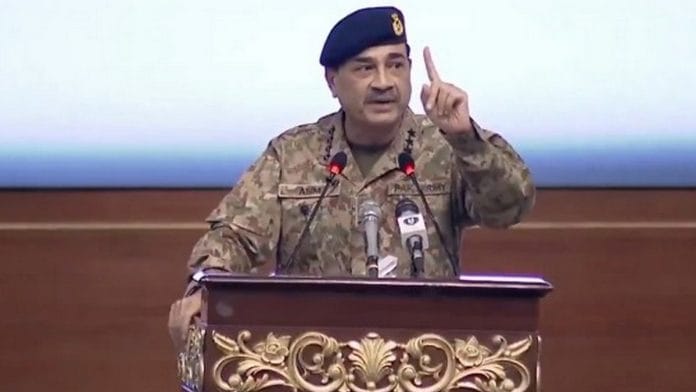New Delhi: Pakistan’s Chief of Army Staff, Field Marshal Asim Munir, has once again raised the Kashmir issue, months after Operation Sindoor. In a speech at the Pakistan Naval Academy, Munir reaffirmed Pakistan’s commitment to providing “political, diplomatic, and moral support” to the people of Kashmir for the “legitimate struggle” of the Kashmiri people.
Speaking at a passing out parade Saturday, Munir dismissed India’s characterisation of insurgent activity in Jammu and Kashmir as terrorism.
“What India tends to term as terrorism is in fact a legitimate struggle as per international conventions,” Munir said, addressing a gathering that included senior military officials, government representatives, and foreign diplomats. He argued that attempts to suppress the Kashmiri movement have only “made it more relevant and pronounced”.
The army chief reiterated Islamabad’s long-standing position that Kashmir is a core issue in South Asia. “We stand firm with the Kashmiri people for their right of self-determination… in accordance with UN Security Council resolutions and the aspirations of the people of Kashmir”.
He said that regional peace would remain elusive without a “just and peaceful resolution” to the Kashmir dispute.
This is not the first time Munir has raised the Kashmir issue this way. In April, for instance, he described Kashmir as the “jugular vein” of Pakistan at a convention for overseas Pakistanis in Islamabad.
While the rhetoric is not new for Pakistan’s military establishment, Munir’s remarks come at a time when international developments, notably diplomatic gestures from the United States and China, appear to have emboldened Islamabad.
Threats & challenges
Touching upon recent military tensions, Munir accused India of “unprovoked aggression” against Pakistan, referring to Operation Sindoor, carried out in the aftermath of the deadly Pahalgam attack.
Referring to the retaliation to Operation Sindoor, Munir claimed that Pakistan showed “restraint and maturity” in its military response and called the country a “net regional stabiliser”.
He also referenced the 2019 Balakot air strikes by India following the Pulwama suicide bombing, labelling them as further examples of “acts of aggression under the pretext of counter-terrorism”.
However, he warned that any miscalculation about Pakistan’s defensive capabilities would be a “dangerous misreading of strategic fundamentals”.
“Any enemy acting on a perceived vulnerability of Pakistan under the illusion of strategic impunity would get an assured, swift, and very befitting response,” Munir said.
Not a new rhetoric
Munir’s remarks come weeks after US President Donald Trump hosted him for a lunch meeting at the White House. At the time, Trump publicly praised the general for what he described as a decisive role in halting the fighting between India and Pakistan.
“This man [Munir] was extremely influential in stopping it from the Pakistani side, and PM [Narendra] Modi from the Indian side,” Trump said, adding, “They were going at it, and both are nuclear countries. I stopped a war between two major nations.”
Pakistan has continued to highlight Trump’s involvement, even endorsing him for a Nobel Peace Prize. India, however, has downplayed the president’s claims, maintaining that Operation Sindoor ended after direct bilateral dialogue and not due to third-party intervention.
Additionally, last week, India refused to sign a joint statement which would have diluted the country’s stand at Shanghai Cooperation Organisation (SCO) Defence Ministers’ meet over the issue of terror.
As reported by ThePrint earlier, Defence Minister Rajnath Singh objected to the attempts to dilute the issue of terror and downplay the Pahalgam attack, even as both China and Pakistan pushed for dropping the mention of the Pahalgam attack but wanted inclusion of the Jaffar Express attack in Pakistan’s Balochistan province.
Capitalising on the developments at the SCO, Munir invoked Balochistan in his weekend speech, framing the region’s insurgency as a counterpoint to India’s concerns.
“If the 1.3-million strong Indian Army can’t intimidate us…you will see that we will beat these terrorists very soon,” Munir said, dismissing threats from Baloch separatists and tying them to foreign support.
(Edited by Sanya Mathur)
Also Read: India refuses to sign SCO joint statement over terror issue, Pahalgam & Jaffar Express attacks







A country can use its resources to benefit its people and progress. But some can only feed hatred and survive in power. The vast majority are below average in IQ level and can be deceived easily, particularly in this country. Pity isn’t it?